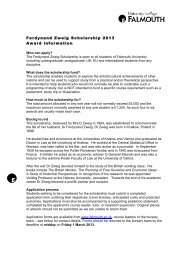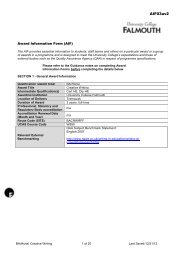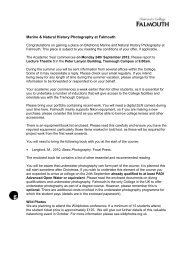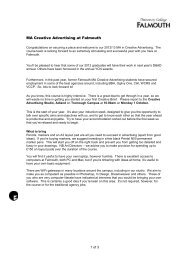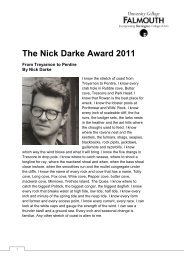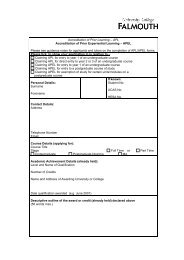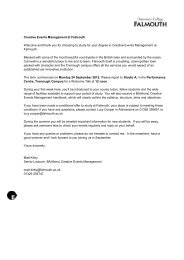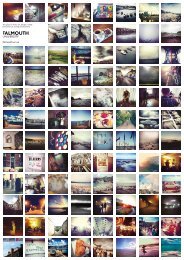Marine & Natural History Photography - University College Falmouth
Marine & Natural History Photography - University College Falmouth
Marine & Natural History Photography - University College Falmouth
You also want an ePaper? Increase the reach of your titles
YUMPU automatically turns print PDFs into web optimized ePapers that Google loves.
<strong>Marine</strong> & <strong>Natural</strong> <strong>History</strong> <strong>Photography</strong> at <strong>Falmouth</strong><br />
Congratulations on gaining a place on BA(Hons) <strong>Marine</strong> and <strong>Natural</strong> <strong>History</strong> <strong>Photography</strong> at<br />
<strong>Falmouth</strong>. This place is subject to you meeting the conditions of your offer, if applicable.<br />
The Academic Year commences on Monday 24th September 2012. Please report to<br />
Lecture Theatre 3 in the Peter Lanyon Building, Tremough Campus at 9.00am.<br />
During the summer you will be sent information from several offices within the <strong>College</strong>.<br />
Some of it may necessitate a reply. Please check your email regularly. If you intend<br />
being away for any length of time during the summer vacation, please arrange for this<br />
information to be forwarded or responded to on your behalf.<br />
Your academic year commences a week earlier than for other students, as it is essential for<br />
you to undertake a number of inductions that will give access to the <strong>College</strong> facilities and<br />
orientate you with the Tremough Campus.<br />
Please bring your portfolio containing recent work. You will need a digital SLR camera during<br />
your time here. <strong>Falmouth</strong> mainly supports Nikon equipment, so if you are making a new<br />
purchase, please consider this brand as you will be able to borrow college lenses and other<br />
accessories.<br />
There is an equipment/book list enclosed. Please read this carefully and ensure you have the<br />
required equipment, particularly those items marked in bold text, as these will be required for<br />
project work from the first week onwards.<br />
You will need to bring the following book with you at the start of the course:<br />
Langford, M., 2010. Basic <strong>Photography</strong>. Focal Press.<br />
The enclosed book list contains a list of other essential and recommended reading.<br />
You will be aware that underwater photography can form part of the course; it is planned this<br />
will start sometime after Christmas. If you wish to undertake this element of the course you<br />
are expected to arrive at college on the 24th September already qualified to at least PADI<br />
Advanced Open Water or equivalent. Please read the enclosed documents on diving<br />
qualifications and underwater photography. <strong>Falmouth</strong> is the only <strong>College</strong> in the UK to offer<br />
underwater photography as part of a degree course. However, please remember this is<br />
optional. There are additional costs involved in the underwater photography programme for<br />
which the student pays (details are in the enclosed paperwork).<br />
Wild Photos<br />
We are planning to attend the Wildphotos conference. If a minimum of 15 students attend,<br />
the student ticket price is approximately £125. We will give out further details of this valuable<br />
networking event in October. For more information please see wildphotos.org.uk
Have a good summer and we look forward to seeing you on 24th September 2012.<br />
Yours sincerely<br />
Sue Boafo<br />
Award Leader, BA(Hons) <strong>Marine</strong> & <strong>Natural</strong> <strong>History</strong> <strong>Photography</strong><br />
01326 213819<br />
sueb@falmouth.ac.uk
<strong>Marine</strong> and <strong>Natural</strong> <strong>History</strong> <strong>Photography</strong> Booklist<br />
Essential reading<br />
The course team will discuss these books with you at the start of term. There is no need to<br />
purchase them at this stage.<br />
Angel, H., 1994. Photographing The <strong>Natural</strong> World. Collins & Brown.<br />
Begon, M., 2005. Ecology: from Individuals to Ecosystems. Blackwell Publishing.<br />
Breslow, N., 1991. Basic Digital <strong>Photography</strong>. London: Focal Press.<br />
Fish, J. Fish, S., 1996. A Students Guide to the Seashore. Cambridge <strong>University</strong> Press.<br />
Haywood, P.J. Ryland, J.S., 1995. Handbook of the <strong>Marine</strong> Fauna of North-West Europe.<br />
Oxford <strong>University</strong> Press.<br />
Langford, M., 2008. Advanced <strong>Photography</strong>. Focal Press.<br />
Smith, C., 2004. Complete British Wildlife. Collins.<br />
Recommended reading<br />
You do not need to buy these books but they will be useful during your course.<br />
Attenborough, D., 1979. Life on Earth. BBC Books.<br />
Brackenbury. J., 2004. Macrophotography-Close Up. Rotavision.<br />
Crawford, W., 1979. The Keepers of Light. New York: Morgan & Morgan.<br />
Carson, R., 1998. The Edge of the Sea. Manner Books.<br />
Davies, A. Fennessy, P., 2002. Digital Imaging for Photographers. Focal Press.<br />
Evening, M., 2010. Adobe Photoshop for Photographers. Focal Press.<br />
Ford, B., 1999. Sensitive Soul’s. Little Brown.<br />
Gatto, J. Porter, A. and Selleck, J., 1987. Exploring Visual Design. Davis Publications.<br />
Gibson, R., 2001. Photographic Guide to the Sea & Shore Life of Britain & North-west<br />
Europe. Oxford <strong>University</strong> Press.<br />
Gibson, R., 2001. Photographic Guide to the Seashore. Oxford <strong>University</strong> Press.<br />
Haywood, P., 1996. Collins Guide to the Seashore. Harper Collins Publishers.<br />
Hirsch, R., 2004. Exploring Colour <strong>Photography</strong>: A Complete Guide. Lawrence King<br />
Publishing.<br />
Hunter, F. Fuqua, P., 1990. Light, Science & Magic. Focal Press.<br />
Ingledew, J., 2005. <strong>Photography</strong> Portfolio. Laurence King.<br />
Jeffrey, I. 1981. <strong>Photography</strong>, A Concise <strong>History</strong>. Thames and Hudson.<br />
Piney, P., 1991. Oceanography: An Introduction to the Planet Oceanus. West Publishing<br />
Company.
General information for students<br />
You are required to have your own DSLR camera system and all the items listed below. You<br />
may need to purchase other items but this will become clear as you progress through the<br />
course and tutors give advice where needed. If purchasing new equipment, consider getting<br />
Nikon as the college mainly keeps lenses and accessories for this system.<br />
You are expected to provide most of the photographic materials yourself such as film,<br />
printing paper and so on. The actual cost will depend on the amount of work you do, and of<br />
course wastage. You are advised to allow approximately £200 for materials per term.<br />
There will be a number of field trips during the course. Normally, two of these will be<br />
compulsory. Others are optional. Each student pays for the transportation costs, last year<br />
this was £6.50 each, per trip, which covers the hire of the mini-bus. Costs will be higher if<br />
specialist, external guides are used on some of these field trips.<br />
Underwater camera systems are provided by <strong>Falmouth</strong> for students undertaking the<br />
underwater photography element of the course. If you wish to be involved with underwater<br />
photography, please read the enclosed document carefully. This will give you both the entry<br />
requirements and the cost of the diving qualifications, as well as the contribution you will<br />
need to make to the course.<br />
Photographic Equipment List<br />
The course in the first half of the academic year is digital. You will need:<br />
Digital SLR camera of reasonable quality with manual over-ride to any automatic<br />
settings (Nikon is recommended as it is compatible with college equipment)<br />
Digital SLR memory card (High Speed) not less than 2G<br />
Digital portable hard drive<br />
Lens hood and UV/Skylight filter for each of your lenses<br />
Digital cable release<br />
Camera equipment holdall – large enough for extra items you may wish to<br />
use/purchase during the course<br />
Sturdy tripod<br />
Blower brush<br />
Lens cleaning cloth<br />
16"x12" Print Box for storing prints and submitting them for assessments. Print<br />
boxes can be purchased from ‘Silver Print’, ‘Process Supplies’ or similar companies<br />
Academic Year Diary<br />
In addition, there will also be a number of stationery items that you will need to<br />
purchase during the course such as notepads, A4 binders, Stanley knife, scissors<br />
and so on.<br />
Please note the equipment marked in bold are items you will need in the first week of<br />
the course.
The second half of the year will be film (still images) based. You will need:<br />
Film SLR camera (an advantage - please bring it along if you have one)<br />
SLR camera filters e.g. red, green, yellow may also be useful when you are shooting<br />
film<br />
Patterson’s developing tank to take 120mm films<br />
Negative filing system binder (loose leaf type)<br />
120 negative filing pages for above binder<br />
Magnifier – Linen tester or Lupe<br />
Small spirit level (no longer than 4”)<br />
2 Toyo or Fidelity 4 x 5 dark slides<br />
12 inch cable release to fit an analogue camera (screw thread with lock)<br />
Black Focusing cloth (or piece of black cotton cloth 1 metre square)<br />
Pair of rubber gloves<br />
Spotting brush - No1 sable<br />
Black print spotting medium or tube of black water colour or gouache<br />
Essential Personal Items<br />
By the very nature of the course, you will be expected to work in all sorts of locations and<br />
weather conditions. It is therefore essential that you come fully prepared with the right sort of<br />
personal clothing to protect yourself from the elements and meet risk assessment<br />
requirements. This list is not exclusive, so please use it as a guide.<br />
Anorak or weather/wind proof jacket<br />
Warm headgear<br />
Strong waterproof boots/shoes<br />
Wellington boots<br />
Gloves<br />
Waterproof trousers as jeans are not always appropriate particularly in wet weather<br />
Mobile phone for emergencies<br />
Binoculars 8x30 (these can be purchased in <strong>Falmouth</strong> from Associated <strong>Photography</strong>,<br />
01326 319591 or email associatedphotography@btconnect.com The course has<br />
negotiated a discount of 20-30% depending on brand. You will need to show your<br />
student ID card once you have enrolled.)
Underwater photography course - student guidance<br />
This document has been produced for student reference and is intended to provide guidance<br />
on the prerequisites, content and costs of the taught underwater photography course offered<br />
to first year (Level 4) <strong>Marine</strong> and <strong>Natural</strong> <strong>History</strong> <strong>Photography</strong> students. A brief description of<br />
the prerequisites for the taught second year (Level 5) course and for conducting independent<br />
student projects is also provided. Requirements are summarised at the end of this document.<br />
First year (Level 4) underwater photography course<br />
The first year underwater photography course will take place from February to May 2013 and<br />
provides an introduction to the theory and practice of macro and wide-angle underwater<br />
photography through a combination of classroom and pool sessions and sea dives using<br />
Nikon D200 cameras.<br />
Prerequisites<br />
In order to take part in the Level 1 underwater photography course students must, by<br />
October 2012:<br />
be a certified diver to a minimum of PADI Advanced Open Water Diver or BSAC Sports<br />
Diver or CMAS 2* or equivalent<br />
have a valid certificate of fitness to dive (as issued by your dive training organisation)<br />
have conducted a dive in UK waters in the previous 6 months<br />
An experience dive will be offered in October 2012 in order to familiarise you with the local<br />
dive site. The cost for this dive will be over and above the course fee. The anticipated cost<br />
for this dive will be approximately £30.<br />
Dive training<br />
You are strongly advised to commence your dive training now if you have not already done<br />
so. If you wish to undertake PADI training (Professional Association of Diving Instructors) you<br />
can visit www.padi.com to identify your nearest PADI dive school. If you wish to undertake<br />
BSAC (British Sub-Aqua Association) training you can visit www.bsac.com to find your<br />
nearest branch. Please note that BSAC training is often scheduled over a longer time period<br />
than PADI training and that both PADI and BSAC course completion is subject to delays in<br />
bad weather. Don’t leave it to the last minute!<br />
You can complete dive training when abroad, but diving in tropical waters does not readily<br />
compare to diving in UK waters, so you should ideally do some diving in the UK once<br />
qualified. There are local dive training providers here in <strong>Falmouth</strong> but remember that this<br />
option would require you to come to Cornwall ahead of the start of your academic year to<br />
complete your dive training.<br />
Costs<br />
There is a fee for taking part in the first year underwater photography course. The exact cost<br />
depends on the numbers taking part, but in 2012/13 the fee will not exceed £350. This fee<br />
includes the provision of:<br />
all classroom sessions<br />
tutor supervised pool and sea dives<br />
the use of Nikon D200 cameras, underwater housings and strobes for all pool and sea<br />
dives<br />
hire of the pool for initial training sessions<br />
the hire of diving equipment supplied by an external contractor for all pool and sea dives<br />
the provision of safety divers and shore cover, supplied by an external diving contractor,<br />
for all pool and sea dives
Personal diving equipment<br />
Although the core diving equipment is supplied by an external diving contractor, students<br />
should acquire some basic diving equipment of their own.<br />
Timing devices are not supplied by the diving contractor. Priority should therefore be<br />
given to acquiring a timing device, either a dive computer or a dive watch. As a minimum,<br />
you should have a dive watch with a bezel (to be suitable for diving they should be depth<br />
rated to 200m). These can be bought for as cheaply as £20 from outlets such as Argos.<br />
Dive computers represent a greater initial investment (Suunto dive computers start at<br />
about £180) but provide more information about your dive and are an essential purchase<br />
if you are planning to go on diving holidays (conducting multiple dives over multiple days)<br />
or conduct boat dives.<br />
Students should acquire their own diving gloves as these are not supplied by the dive<br />
contractor. A thickness of 3mm provides some thermal protection while still allowing<br />
manual dexterity with the cameras. 5mm gloves will provide more thermal protection but<br />
create some loss of dexterity when handling the camera equipment. The approximate<br />
price for diving gloves is from £15 upwards.<br />
Students are also very strongly encouraged to acquire their own mask and hood and fins<br />
to ensure personal fit and comfort.<br />
Suits are supplied by the diving contractor but to ensure maximum fit and comfort,<br />
students are very strongly encouraged to acquire a semi-dry suit (a 5mm under suit and a<br />
5mm over suit is the norm) or a dry suit. If you are a dry suit diver, you should have proof<br />
of dry suit training.<br />
If you already own all of your own diving equipment, and only require tank and weights to<br />
conduct your dives, there will be a reduction in the fee for the course as negotiated between<br />
<strong>Falmouth</strong> and the Dive Contractor.<br />
Personal camera equipment<br />
All camera equipment is supplied by <strong>Falmouth</strong> but students must supply:<br />
Batteries for strobes. You may wish to consider purchasing re-chargeable batteries but a<br />
pack of 4 AA batteries (each strobe requires 4 batteries) can be purchased from the<br />
<strong>Photography</strong> Centre for approx £1.50 per pack. One pack of batteries will generally cover<br />
two dives.<br />
Compact flash memory card. A minimum memory size of 4GB is recommended as you<br />
will want to shoot in raw format or raw and .jpeg format simultaneously. These are<br />
available for less than £15 from outlets such as Amazon. The types of San Disk compact<br />
flash cards tested and approved for use in the Nikon D200 are presented in the table<br />
below.<br />
SanDisk SDCFB 128MB, 256MB, 512MB, 1GB, 2GB, 4GB<br />
SDCFB (Type II) 300MB<br />
SDCF2B (Type II) 256MB<br />
SDCFH (Ultra II) 256MB, 512MB, 1GB, 2GB, 4GB, 8GB<br />
SDCFX (Extreme III) 1GB, 2GB, 4GB
Academic assessment<br />
Assessment of academic accomplishment will include:<br />
record of attendance (classroom, pool and sea)<br />
weekly presentation and critical review of photographs in class<br />
submission of a workbook of pool and sea photographs with critical review of the<br />
photographs presented. A detailed brief for the workbook will be supplied.<br />
submission of 6 photographs (2 macro, 2 wide-angle, 2 half-in/half-out shots) in .jpeg<br />
format on CD<br />
Practical skills assessment<br />
In addition to academic assessment, through tutor observation, assessment will take place<br />
of:<br />
correct camera preparation, operation and post-dive maintenance<br />
buoyancy control<br />
ability to correctly handle and use the camera equipment underwater<br />
attitude towards safety and observation of diving codes of practice<br />
Missed sessions<br />
The Level 1 underwater photography course represents a succession of skills development<br />
through the classroom, pool and sea dives. It is therefore vitally important that students do<br />
not miss sessions. If illness or another legitimate reason prevents a student from attending a<br />
classroom, pool or sea session, the tutor must be informed as early as possible. Repeatedly<br />
missing classroom sessions or dives will lead to failure of the programme. There will be no<br />
refund for missed sessions.<br />
Successful completion of the first year underwater photography course<br />
If all elements of the first year underwater photography course are completed to the tutor’s<br />
satisfaction, the student will receive a pass. Students who pass the first year course may<br />
then progress to the taught second year course if they wish to . Please see below.<br />
Second year (Level 5) underwater photography course (October to November 2013)<br />
To further develop your skills in handling the underwater camera systems, to try additional<br />
techniques and equipment and to further develop your personal portfolio of underwater<br />
images, a taught second year underwater photography course will be offered. A brief on the<br />
aims, content and cost of the taught second year course will be supplied towards the end of<br />
the first year course. No additional dive training will be required to take part in the taught<br />
second year course, so a PADI Advanced Open Water certificate or BSAC Sports Diver or<br />
CMAS 2* or equivalent remains the minimum requirement.<br />
In addition to the second year taught course, an underwater photography field trip abroad will<br />
be offered in 2012/13 to provide a further opportunity to develop your underwater<br />
photography and build your portfolio.<br />
Both the second year taught course and the underwater photography field trip are entirely<br />
optional. You can choose to do one, both or neither.
Independent student diving projects<br />
At the end of the first year underwater photography course, students will also be assessed as<br />
to whether they are competent to use the underwater camera systems without tutor<br />
supervision.<br />
In order to conduct independent student diving projects with the camera systems in the<br />
second and third years, however, students must have acquired the PADI Rescue Diver<br />
qualification or equivalent, produced a project plan and risk assessment and had their<br />
project plan and risk assessment approved by the Diving Safety Officer. Tutor support will be<br />
available to help with the project plan and risk assessment process. More detailed briefs on<br />
the requirements and conduct of student diving projects will be supplied towards the end of<br />
the first year underwater photography course.<br />
Further enquiries<br />
We hope you have found this student guidance helpful. If you have any further queries<br />
please contact:<br />
Gaynor Bennett M.A. MSc.<br />
Underwater <strong>Photography</strong> Course Lecturer, Diving Safety Officer , PADI Staff Instructor<br />
BA(Hons) <strong>Marine</strong> and <strong>Natural</strong> <strong>History</strong> <strong>Photography</strong><br />
<strong>Photography</strong> Centre<br />
<strong>University</strong> <strong>College</strong> <strong>Falmouth</strong><br />
Tremough Campus<br />
Penryn<br />
Cornwall<br />
TR10 9EZ<br />
Gaynor.Bennett@falmouth.ac.uk<br />
www.falmouth.ac.uk
First year (Level 4) underwater photography prerequisites and skills development<br />
First year students who wish to take part in the underwater photography course must meet<br />
the following Stage 1 prerequisites to attend the underwater photography course and must<br />
meet the criteria at Stages 2 and 3 to achieve a pass for the Level1 underwater photography<br />
course.<br />
Stage 1<br />
Prerequisites<br />
Dive certification<br />
Requirement<br />
Students must be<br />
qualified to at<br />
least PADI<br />
Advanced Open<br />
Water Diver or<br />
equivalent.<br />
Medical fitness Students must<br />
have a valid<br />
Certificate of<br />
Medical Fitness.<br />
This may be an<br />
HSE certificate or<br />
that<br />
recommended by<br />
their recreational<br />
dive training<br />
organisation<br />
(PADI or BSAC).<br />
Purpose<br />
To have<br />
acquired formal<br />
certification as<br />
evidence of a<br />
specified level<br />
of competence<br />
in recreational<br />
diving.<br />
To ensure<br />
fitness to dive<br />
for the student’s<br />
safety and the<br />
safety of others.<br />
Service<br />
Provider<br />
Any nationally or<br />
internationally<br />
approved dive<br />
training provider<br />
(e.g. PADI,<br />
BSAC, CMAS).<br />
Medical forms<br />
may be sourced<br />
from dive service<br />
providers or from<br />
the <strong>Falmouth</strong><br />
Course Tutor.<br />
A GP may be<br />
required to sign<br />
the medical<br />
form. There may<br />
be a charge<br />
associated with<br />
this.<br />
Comments<br />
Students may<br />
have been<br />
qualified for<br />
many years or<br />
have newly<br />
qualified for the<br />
purposes of<br />
joining this<br />
award.<br />
Medicals are<br />
valid for 12<br />
months from<br />
date of signing<br />
and must be<br />
refreshed<br />
annually. A GP<br />
signature will be<br />
required if<br />
students answer<br />
‘yes’ to any<br />
questions on the<br />
medical form.
Stage 1<br />
Prerequisites<br />
Scuba review/<br />
skills refresher<br />
Local orientation<br />
dives<br />
Requirement<br />
Students should<br />
have conducted at<br />
least one dive in<br />
the 6 months prior<br />
to commencing<br />
their pool dives<br />
with cameras. If<br />
they have not<br />
dived within this<br />
period they must<br />
show evidence of<br />
having completed<br />
a scuba<br />
review/skills<br />
refresher.<br />
Students should<br />
have conducted at<br />
least one sea dive<br />
in UK waters prior<br />
to the first sea<br />
dive with camera.<br />
A local orientation<br />
dive will be<br />
offered in October<br />
2012 (section<br />
2.1).<br />
Purpose<br />
To refresh both<br />
theory and<br />
practical dive<br />
skills through<br />
classroom, pool<br />
and sea dive<br />
sessions.<br />
To ensure<br />
familiarity with:<br />
-UK diving<br />
-the dive<br />
equipment<br />
-the main site<br />
used for<br />
photography<br />
dives.<br />
Service<br />
provider<br />
Any nationally or<br />
internationally<br />
approved dive<br />
training provider<br />
(e.g. PADI,<br />
BSAC or<br />
CMAS).<br />
Approved local<br />
provider or<br />
student’s choice<br />
of dive service<br />
provider<br />
(ideally UK<br />
dive(s) - dive<br />
site should<br />
include<br />
Pendennis Silver<br />
Steps,<br />
<strong>Falmouth</strong>).<br />
Comments<br />
The scuba<br />
review/skills<br />
refresher should<br />
be recorded in<br />
the student’s<br />
dive log and<br />
signed by the<br />
instructor who<br />
completed the<br />
review.<br />
Even students<br />
who have been<br />
qualified for<br />
many years and<br />
who are familiar<br />
with UK diving<br />
are advised to<br />
familiarise<br />
themselves with<br />
the dive site at<br />
Pendennis.
Stage 2<br />
Classroom and<br />
pool sessions<br />
Classroom<br />
sessions<br />
Camera<br />
induction<br />
Requirement<br />
To attend<br />
scheduled<br />
classroom theory<br />
sessions and dive<br />
briefings.<br />
To attend a<br />
camera housing<br />
induction.<br />
Pool dives To attend two<br />
supervised pool<br />
dives with<br />
camera.<br />
Purpose<br />
To ensure<br />
knowledge of<br />
underwater<br />
photography<br />
and logistical<br />
and safety<br />
considerations.<br />
To ensure<br />
familiarity with<br />
camera<br />
operation and<br />
housing<br />
preparation and<br />
maintenance.<br />
To orient to<br />
camera use and<br />
buoyancy<br />
characteristics<br />
of camera<br />
equipment.<br />
Service<br />
provider<br />
<strong>Falmouth</strong><br />
lecturer.<br />
<strong>Photography</strong><br />
Centre<br />
nominated<br />
person.<br />
<strong>Falmouth</strong><br />
lecturer and<br />
<strong>Photography</strong><br />
Centre<br />
nominated<br />
person<br />
Comments<br />
Classroom<br />
sessions<br />
immediately<br />
prior to pool and<br />
sea dives<br />
include vital dive<br />
logistics and<br />
safety briefings.<br />
This maximises<br />
the opportunity<br />
for successful<br />
pool and sea<br />
dives and<br />
reduces risk to<br />
camera<br />
equipment from<br />
flooding.<br />
This maximises<br />
the opportunity<br />
for successful<br />
sea dives and is<br />
an essential<br />
prerequisite for<br />
taking part in the<br />
sea dives.




